
Amazing Fantasy (vol. 1) #15
Title: “Spider-Man”
Medium: comic
Cover date: Aug. 1962
Publisher:
Keywords: science, chemistry, nerd, loving home, family, ethical values, miraculous, miracle, fate, destiny, vengeance, bitterness, teasing, power, responsibility
12 characters in this story:
| Character (Click links for info about character and his/her religious practice, affiliation, etc.) |
Religious Affiliation |
Team(s) [Notes] |
Pub. | # app. |
||||||
|---|---|---|---|---|---|---|---|---|---|---|
|
|
Secret Defenders; Spider-Man and His Amazing Friends...  |
 |
10,664 | ||||||
|
|
[raised Peter Parker (Spider-Man)] |  |
1,368 | ||||||
|
|
U.S. Army |  |
718 | ||||||
|
[longtime friend of Peter Parker] |  |
429 | |||||||
|
|
[Spider-Man's beloved late uncle] |  |
51 | ||||||
|
[1st app: Amazing Fantasy (vol. 1) #15 (Aug. 1962)] |  |
25 | |||||||
|
|
[murdered Spider-Man's Uncle Ben] |  |
9 | ||||||
|
[wrestled Spider-Man in his first public appearance] |  |
1 | |||||||
|
[Peter Parker's science teacher; Jackal's brother] |  |
6 | |||||||
|
[Spider-Man's former agent] |  |
13 | |||||||
|
Midtown High School [Peter Parker's high school classmate; Flash's buddy] |
 |
19 | |||||||
|
[school Peter Parker attended] |  |
159 |
HIGHLIGHTS: Peter Parker is introduced as a socially inept bookworm (nerd) who loves science. He is raised by his very loving Uncle Ben and Aunt May, who taught him strong ethical values. Nevertheless, Peter is bitter, vengeful and self-centered, in part due to teasing by thoughtless classmates (particularly Flash Thompson).
When Peter gains spider powers in a scientific accident, the narration and Peter's own thoughts credit "fate" with this "miraculous" event. After Peter's beloved uncle dies at the hands of a thief Peter thoughtlessly allowed to escape from an earlier crime, Peter learns that "with great power there must also come great responsibility."
Amazing Fantasy #15 (published in 1962) features the first-appearance of Spider-Man. As such, this is one of the most influential comic books ever published. The character of Spider-Man broke the mold among super-hero characters in many ways, and subsequently became very popular as well as much-imitated.
BELOW: All 11 pages of Amazing Fantasy #15:

Source: Amazing Fantasy (vol. 1) #15 (Aug. 1962). Written by Stan Lee. Art by Steve Ditko.
One of the innovations of the Spider-Man character was how grounded he was in contemporary reality. Instead of having access to fabulous wealth and technological or mythological resources (as did characters such as the Fantastic Four, Iron Man, Ant-Man and Thor), Peter Parker was an everyman whose humble economic circumstances and social standing was less removed from the average American comic book reader. Peter Parker had very real, even mundane problems. Yet, far from making the character "boring," it made his stories even more interesting.
Despite being relatively more grounded in reality than contemporary comic book characters, one bit of "unreality" in Spider-Man's early stories was the taboo - still very much in effect at the time of his creation - against overt portrayal of overtly religious themes and characters in popular media. Rather than overtly identifying the specific church or faith or belief system to which Peter Parker and his family belonged, Spider-Man's early stories only portrayed the character's values and ethics. Readers could decide for themselves what Peter Parker's specific religious affiliation and beliefs might be based on how he acted, but there was nothing in the character to suggest non-normative religious beliefs or affiliation. He was clearly raised with a strong value system by a very loving, attentive, highly ethical aunt and uncle. Beyond this, little was revealed in early Spider-Man stories about the title character's religion. In keeping with Peter Parker's "everyman" status, virtually all aspects of the character could be associated with people of essentially any American ethnic, racial or religious background.
Page 1: The first thing we learn about Peter Parker is that he is a socially inept nerd (although this word may not have been in vogue at the time). On the very first page of the very first comic book that introduced Spider-Man, Peter Parker's classmates call him a "bookworm" (popular jock Flash Thompson's favorite word for him) and "Midtown High's only professional wallflower." Flash also suggests that Peter is ignorant of various dance forms. The more popular teens in Peter's high school suggest that Peter would be out of place at a dance. Looking at the silent, slumping, shy Peter Parker, it seems they are probably right.
BELOW: Peter Parker was established as a nerd on the very first page of his very first appearance:
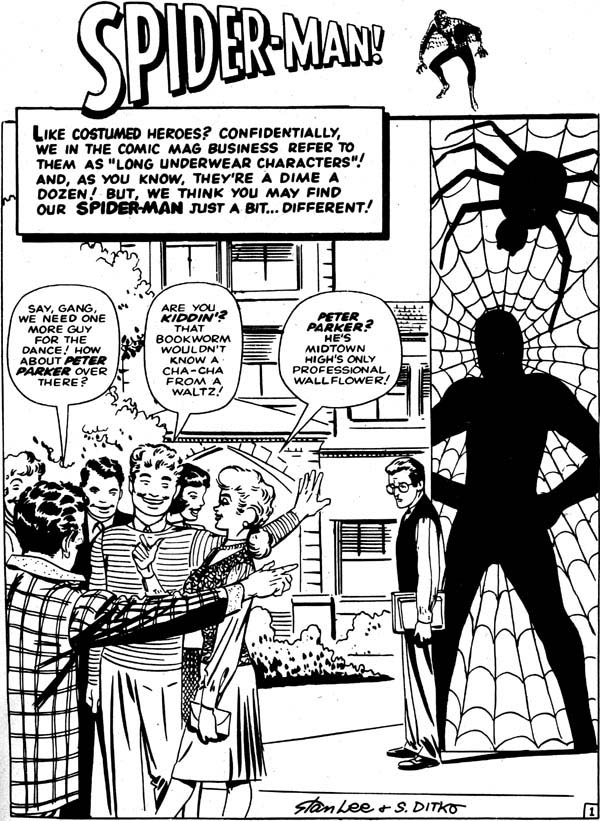
Source: Amazing Fantasy (vol. 1) #15 (Aug. 1962), pg. 1. Written by Stan Lee. Art by Steve Ditko.
It is on the very second panel of Amazing Fantasy #15 (i.e., the first panel of the second page, after the splash page) that we first see a glimpse of the character trait that would become one of the most important for the character of Peter Parker: his love of science, particularly chemistry. The text in this panel mentions nothing about science, but in Steve Ditko's simple drawing we see in the background of Peter's room a chemistry set (and a bookshelf).
BELOW: A loving Uncle Ben and Aunt May raised science-loving Peter Parker:
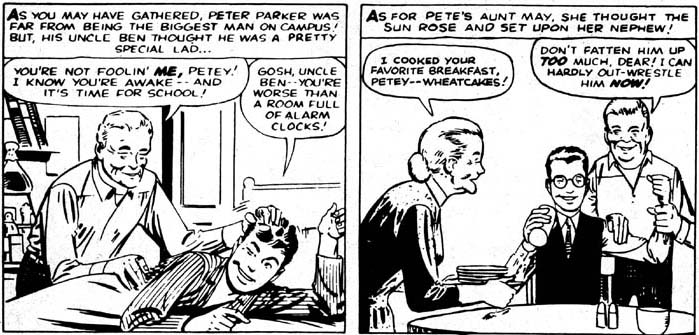
Source: Amazing Fantasy (vol. 1) #15 (Aug. 1962), pg. 2, panels 1-2. Written by Stan Lee. Art by Steve Ditko.
In the first panels of page 2, note also how Peter Parker's Uncle Ben and Aunt May are portrayed. These are the only "parents" Peter has known ever since he was a little boy. Uncle Ben and Aunt May are clearly doting "parents" who love Peter immensely. One can hardly imagine a more loving, supportive family. Uncle Ben is an affectionate, hands-on parent who thought Peter was "a pretty special lad" and suggested to Peter that his muscles were strong. Aunt May, we are told, "thought the sun rose and set on her nephew." Eventually we will see that the love Peter's aunt and uncle raised him with was one of the greatest influences on his life. Their love for him allowed Peter to become a truly compassionate hero, despite the fact that in this first story the teen often seems self-absorbed and bitter.
Peter Parker was quickly established as an extremely bright, studious teen who was admired by his teachers but ostracized by fellow students. Note how panel 3 of page 1 once again associates Peter Parker with a chemistry set. This time we see him enthusiastically using a test tube and beaker in a chemistry class. The smile on his face tells us he is truly in his element. We are told that "the faculty at Midtown High was fond of the clean-cut, hard-working honor student!" Peter's chemistry teacher complements the beaming student and tells him he is sure to get a scholarship when he graduates.
BELOW: Peter Parker: a "clean-cut, hard-working student" and a "bookworm":
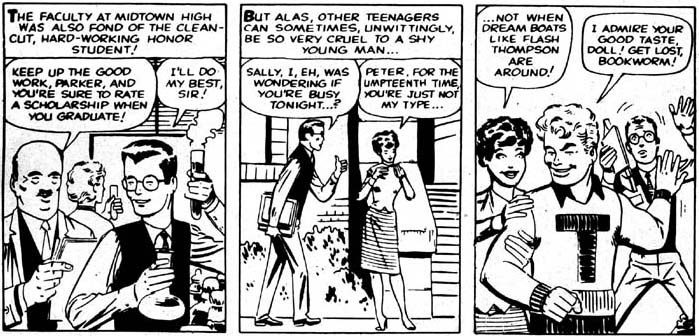
Source: Amazing Fantasy (vol. 1) #15 (Aug. 1962), pg. 2, panels 3-5. Written by Stan Lee. Art by Steve Ditko.
In panel 4 of page 1 we see that Peter is interested in things outside of science. He is interested in girls, but he simply lacks the social graces or physical attractiveness necessary to get a date. He is "shy" and other teenagers at his school can be "very cruel" to him, including perhaps the girl he is asking out for the "umpteenth time."
Panel 5 of page 1 of Amazing Fantasy #15 names Flash Thompson for the first time. After Uncle Ben and Aunt May, Flash is the third Spider-Man supporting character ever introduced by name.
We first saw Flash on page 1, the splash page, and here we see him once again looking handsome and popular, and once again calling Peter a "bookworm." At least for now, Flash is drawn as a fairly negative one-dimensional character. "Get lost, bookworm!" he tells Peter, pushing the scrawny science geek aside. Flash has no time for eggheads like Peter Parker. Flash isn't necessarily evil, but it doesn't seem like the values of any particular religion or value system are manifest in him, either. He is simply a typical high school "jock," set up as a social nemesis for the story's protagonist.
In panels 6-8 of page 2 we see more of Peter Parker's love of science. Peter invites the kids from school to go with him to a "great new exhibit at the Science Hall." He must truly be socially inept to think they might have wanted to go! Or perhaps he is so truly fascinated by science he has a hard time imagining that the other teens in his school wouldn't want to attend such a "great" exhibit.
The kids laugh off his suggestion. Driving away, one of Flash's friends calls Peter a "bookworm." This seems to be a favorite epithet of theirs.
Peter may have some as-yet unexplored appeal to girls. While no girl wants to go out with him at this time, one of the girls with Flash actually seems warm (at least in comparison to the boys) when she tells Peter to "Give our regards to the atom-smashers, Peter!" She at least called him by name, instead of calling him "bookworm." And she waved a him.
Nevertheless, Peter is upset by the way the other kids treat him. The narration tells us this is a "heart-breaking" moment for Peter.
In panel 8 of page 2, Peter walks into the science exhibit while he laments: "Some day I'll show them! (SOB) Some day they'll be sorry! Sorry that they laughed at me!"
Peter at this point is not consumed by thoughts of how exciting the science exhibit will be. He isn't thinking about how it's too bad that the other kids will miss out on this great exhibit. He actually seems to be thinking rather vengeful thoughts. His thoughts may seem understandable and only mildly negative here, but later in this issue we see his thoughts are considerably more vengeful and bitter about the people who mistreat him. This treatment is something is he doesn't speak out about, but inside he really is quite bitter.
BELOW: Just prior to becoming Spider-Man: Peter Parker loves science but is bitter about being teased by classmates:
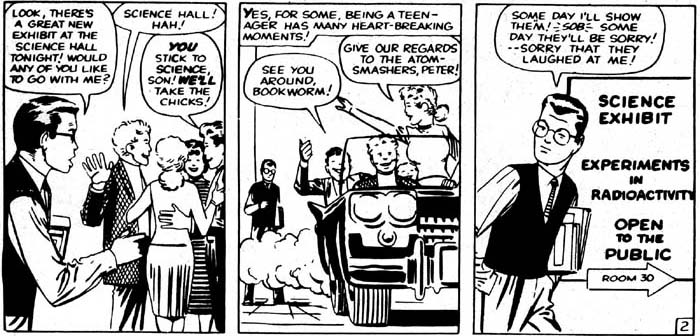
Source: Amazing Fantasy (vol. 1) #15 (Aug. 1962), pg. 2, panels 6-8. Written by Stan Lee. Art by Steve Ditko.
Peter Parker's love of science was established from the onset as an important trait, but it has never really been his most important character trait. Beginning with this very first Spider-Man comic (Amazing Fantasy #15), being the heroic Spider-Man has taken precedence over Peter's love of science.
Why has being Spider-Man trumped science in Peter Parker's priorities? Is it because he enjoyed it so much or because he needed the money he could earn or because he felt a sense of responsibility to use his powers to help others? All of these reasons have played a part in his motivations. But the end result is that science doesn't come first in Peter Parker's life.
A number of other characters, including Reed Richards of the Fantastic Four, clearly have a more intense interest in scientific research than Peter. Throughout the history of the character, Peter Parker has often abandoned his career in science for years at a time. His scientific interests have often taken a back seat even to his career as a photographer, something he clearly is less skilled in than science.
There are a few characters for whom "science" itself is a religion. This is the very definition of "scientism," the philosophy that all science itself takes precedence over all other philosophies, ideologies and human needs. Scientism is almost nearly always portrayed as a foible of villains in comic books. The villainous A.I.M. (Advanced Idea Mechanics) organization and their various leaders, including M.O.D.O.K. and the Supreme Scientists, have been adherents of scientism. Among major Marvel super-heroes, Reed Richards is probably the one who comes closest at times to exhibiting scientism, but occasions when he does so are portrayed as times when he has "lost his way." He must struggle to rediscover what is truly important in his life rather than abandon family responsibilities, morality, and sometimes common sense in the pursuit of pure scientific knowledge.
To his credit, Peter Parker has often been portrayed as a scientist, but has never been portrayed as an adherent of scientism. The ways in which Peter Parker's love of science have influenced his overall value system and philosophy of life are actually more true to life than what we see in many comic book scientists.
Although scientists who fall into scientism can make for some interesting comic book villains and some interesting stories, few genuine professional scientists are actually proponents of scientism. Working scientists are more likely even than non-scientists to understand the scientific method and be aware of the limited scope of science and its strengths as well as limitations in dealing with human problems. In real life, most people whose ideologies, ideas and philosophies could be labeled as "scientism" are not actually professional scientists but are scientific amateurs or "wannabes." They are often people who are frustrated with the belief systems they were raised with or are most familiar with, and they are attracted to "science" as a sort of "ultimate authority" for all things, even in areas in which genuine science can make no determination. Eugenics, as practiced by Nazis during World War II and later by various Communist groups in places such as China and Cambodia, is a well-known example of non-scientist political leaders appealing to "science" for solutions that could not actually be supported by genuine science.
Even in Amazing Fantasy #15, which heavily emphasizes Peter Parker's scientific curiosity and acumen, it is easy to see that Peter is not just a scientist. He has many other concerns and interests. He is a fully-realized, well-rounded, rather realistic character. After gaining super powers, Peter uses them to become an entertainer. He loves the adulation of the crowds. He uses his powers to make money. He thinks about using his powers to "get back" at the people who mistreated him.
Peter Parker uses his scientific skills to augment his Spider-Man identity with web-shooters and webbing, but he isn't consumed with scientific interest in his own powers. His interests are more practical: How can his powers benefit him. Later his interests are more altruistic: How can he use his powers for the benefit of others. Even when he first gains his powers, he ascribes the event to "fate", which is another word for destiny or "the ultimate agency that predetermines the course of events." Peter seems less interested in the scientific explanation for how a radioactive spider bite gave him spider-powers than in why fate has given him these powers and what he is meant to do with them.
So, from the very beginning Peter's interest in science is important, but not his "defining" characteristic (or at least not his only defining characteristic), and certainly not all-consuming. Nothing can be read into Peter Parker's interest in science, in and of itself, to better understand the character's religious affiliation. In 1962, the majority of American scientists believed in God and identified themselves with a specific religious affiliation. The same could be said two decades later when Scientific American published the results of an extensive survey of American scientists, and the same could be said decades earlier when other publications and studies covered the same subject. But the same can be said for the majority of Americans in nearly all known professions, so this is hardly diagnostic and there is no reason to think that Peter Parker was more likely to have any particular religious background simply because of his interest in science. There is nothing in the writings of Spider-Man co-creator Stan Lee or his contemporaries to indicate that they regarded scientists as more likely (or less likely) to be religiously-inclined or adherents of a particular religion.
BELOW: The narration credits fate with using scientific means to transformation Peter Parker into Spider-Man:
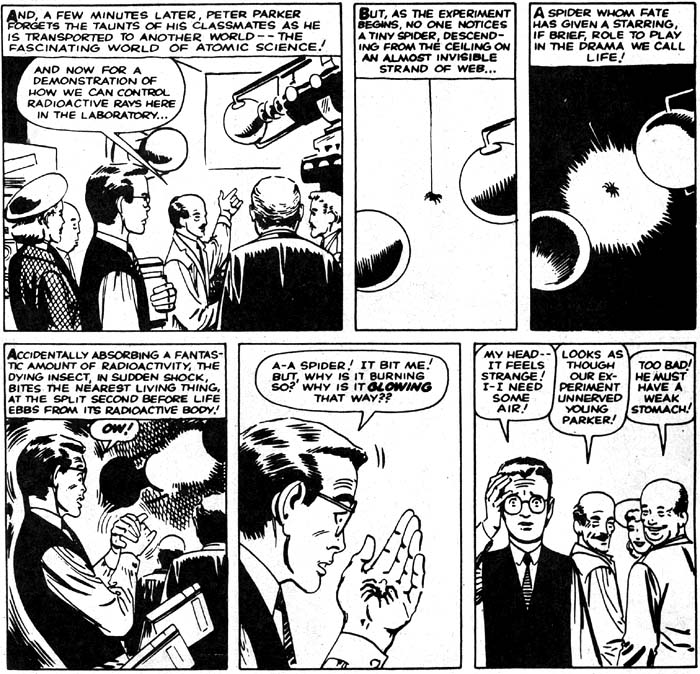
Source: Amazing Fantasy (vol. 1) #15 (Aug. 1962), pg. 3, panels 1-6. Written by Stan Lee. Art by Steve Ditko.
On page 3 of Amazing Fantasy #15, Peter Parker is at the atomic science exhibit and actually receives his super-powers. Note that once he finally is in the exhibit, he "forgets the taunts of his classmates as he is transported to another world -- the fascinating world of atomic science." He really does love science, even if he doesn't think about it all the time. His love for and fascination with science is most evident when he is actively engaged in science or actively learning. But many things distract him from science, even in this first story.
Note how in this original origin story, Peter Parker attends the science exhibit alone, after school. Later depictions of the story re-arrange events slightly. In the Spider-Man feature film directed by Sam Raimi, as well as in the Ultimate Spider-Man retelling of these events, Peter Parker attended the science exhibit as part of a class field trip.
Notice how the narration describes the spider that imbues Peter Parker with power:
Narration: But, as the experiment begins, no one notices a tiny spider, descending from the ceiling on an almost invisible strand of web . . . A spider whom fate has given a starring, if brief, role to play in the drama we call life!
This mention of "fate" is echoed by Peter Parker himself on the next page - panel 4 of page 4, where Peter also refers to the "way" he received powers as "miraculous", a word often associated more with divine intervention than with naturally occurring events:
Peter Parker: [Speaking to himself] It's the spider! It has to be! Somehow -- in some miraculous way, his bite has transferred his own power to me! I can walk down this cable as effortlessly as the spider itself can glide along its web! I-I've got to have time to think! I've got to plan what to do with this unbelievable ability which fate has given me!
BELOW: Peter Parker believes that "fate" has given him his powers in a "miraculous way":
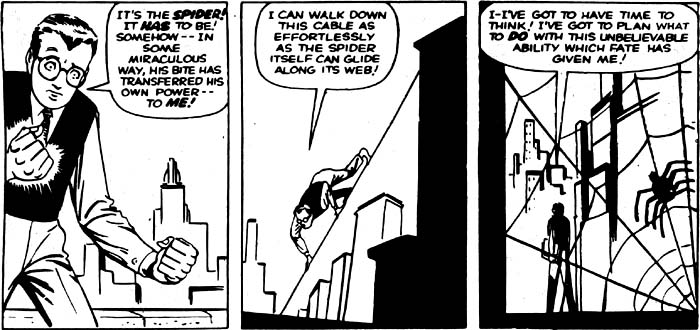
Source: Amazing Fantasy (vol. 1) #15 (Aug. 1962), pg. 4, panels 4-6. Written by Stan Lee. Art by Steve Ditko.
What are we to make of the narrator's description of "fate" choosing the spider for its role and Peter Parker's pondering what to do with the ability that "fate has given" him in such a "miraculous way"?
At the most basic level, one might simply ascribe these words to Stan Lee's flowery style of speech. He may have given these words little conscious thought.
On the other hand, if "fate" really did play a hand in giving Peter Parker his powers, what does this mean? What is fate? It has many definitions, and is often associated with divine will, however that "divinity" might be conceptualized. Was it God's will that Peter Parker become Spider-Man? Some subsequent Spider-Man stories have said "yes," but here the topic is hardly explored in depth, only hinted at in the vaguest way possible. It is probably intentional that readers could interpret this aspect of the story however they want.
A discussion of "fate" within the world of comics is complicated by the fact these are fictional stories which we know were written by an author. Were many events in comics to happen in the real world, they would certainly be identified by many as acts of God, for they clearly violate all known scientific explanation. But in fiction, one "explanation" for inexplicable events is simply that the author wanted something to happen, and so it did. In this sense, the author is "God" for the stories he or she writes. [The notion that writer Stan Lee and artist Jack Kirby are the "God" of the Marvel Universe was suggested visually in Fantastic Four #511 (May 2004), in a story titled "Hereafter Part 3: A Glimpse of God."]
Another difficulty in dealing with the meaning of "fate" in comics is that comics are a popular general medium that have often been written under pressure from taboos which prevent overt references to religious concepts. Authors who genuinely wanted to ascribe some event to the will of God or regard an event as an act of God often used more nebulous words such as "fate" or "Providence" to avoid using the word "God."
Keeping in mind that writer Stan Lee was Jewish, and not Catholic, it is worth considering this etymological discussion from the Catholic Encyclopedia (http://www.newadvent.org/cathen/05793a.htm; viewed 28 January 2008):
Fate ...its meaning as the prime cause of events is better expressed by the term Divine Providence, while, as a constant force at work in the physical universe, it is nothing more nor less than natural law. Hence St. Augustine says (De Civit. Dei, c. i): "If anyone calls the influence or the power of God by the name of Fate, let him keep his opinion, but mend his speech." Fate, in its popular meaning, is something opposed to chance, in so far as the latter term implies a cause acting according to no fixed laws. The unseen power that rules the destinies of men was personified by the ancient Greeks under the name of Moira, or, more generally, as three sisters Moirai, or Fates, whose names were Clotho, Lachesis, and Atropos. Sometimes fate is described as having unlimited sway over gods and men, while at other times the gods, especially Zeus, are described as the rulers of human destiny, or as having the power to change the course offate. With the Moirai the Romans identified their own Parcae or Fata.
The idea of fate as a power in the world came, as St. Thomas tells us (C.G., III, xciii), from the attempt to find a cause for events which appeared to follow no definite law and to be the result of mere chance. Many, who were not satisfied with the explanation of poets and mythologists, turned their thoughts to the heavenly bodies, which, acting according to definite and unchanging laws themselves, were supposed to impress their influence upon events in the lower world. St. Thomas, who was no believer in astrology, evidently supposes that, while Providence acts according to fixed laws in the sidereal system, there is no such uniformity in the case of natural phenomena on earth. These latter are therefore often the result of chance, as far as secondarycauses are concerned, though not so in their relation to God's Providence.
One approach to Stan Lee's references to "fate" on pages 3 and 4 of Amazing Spider-Man #15 is to do as St. Augustine suggests and replace the word "fate" with "God," and see if the sentences make more sense:
Narration: But, as the experiment begins, no one notices a tiny spider, descending from the ceiling on an almost invisible strand of web . . . A spider whom God has given a starring, if brief, role to play in the drama we call life!
Peter Parker: It's the spider! It has to be! Somehow -- in some miraculous way, his bite has transferred his own power to me!... I-I've got to have time to think! I've got to plan what to do with this unbelievable ability which God has given me!
Individual readers will decide for themselves what Stan Lee and/or Peter Parker means by "fate," and whether or not replacing the word "fate" with "God" renders the passage more sensible given the context.
One thing is certain: Immediately after receiving his powers, Peter Parker does not act like a person who thinks of himself as someone called of God or divinely appointed to help others. In fact, he thinks only of himself.
Note that, as seen in the Sam Raimi's Spider-Man feature film, the events which follow in the rest of Amazing Fantasy #15 seem considerably compressed, taking place over only a few days. But in this original version of the story, one can easily imagine that there are many months between the time that Peter Parker receives his powers and he time his uncle is murdered and he finally decides to use his powers to heroically help others.
Peter Parker's initial reaction to receiving his powers is to use them for personal gain. As shown on pages 4 and 5, he earns some money by defeating a formidable wrestler in a wrestling ring after seeing the sing: "$100 to the man who can stay in the ring three minutes with CRUSHER HOGAN."
After this initial public appearance wearing a mask and using his powers goes well, a TV producer complements Peter on his "showmanship" and tells him to contact him. The TV producer tells Peter he would be "a smash on Ed Sullivan's show!"
Encouraged by having earned a little money and inspired by the TV producer's words, Peter decides to make a better costume for himself than just a makeshift mask. In panel 2 on page 6, he begins this task.
Note also, in panel 2 on page 6, another example of how loving and doting Peter's Aunt May and Uncle Ben are. They are apparently always smiling, always supportive. They bring crackers and milk into his room for him, little suspecting what he is up to.
BELOW: Peter Parker's Uncle Ben and Aunt May clearly doted on him and gave him a loving home:
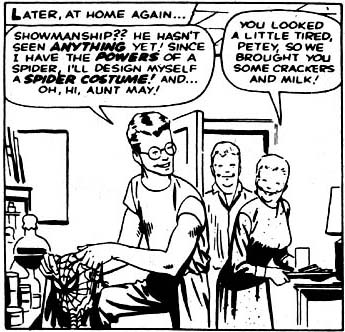
Source: Amazing Fantasy (vol. 1) #15 (Aug. 1962), pg. 6, panel 2. Written by Stan Lee. Art by Steve Ditko.
Panels 3 through 8 on page 6 demonstrate Peter Parker's impressive scientific skill, his natural genius, really. He doesn't even seem to realize how brilliant he must be in order to be able to create his web fluid and web spinners with such ease.
Peter Parker clearly self-identifies as a scientist. Note how he refers to himself as a "science major", even though he's only in high school:
Peter Parker: [Wearing his brand-new Spider-Man costume while testing his web shooters] So, they laughed at me for being a bookworm, eh? Well, only a science major could have created a device like this!
BELOW: Peter Parker's Uncle Ben and Aunt May clearly doted on him and gave him a loving home:
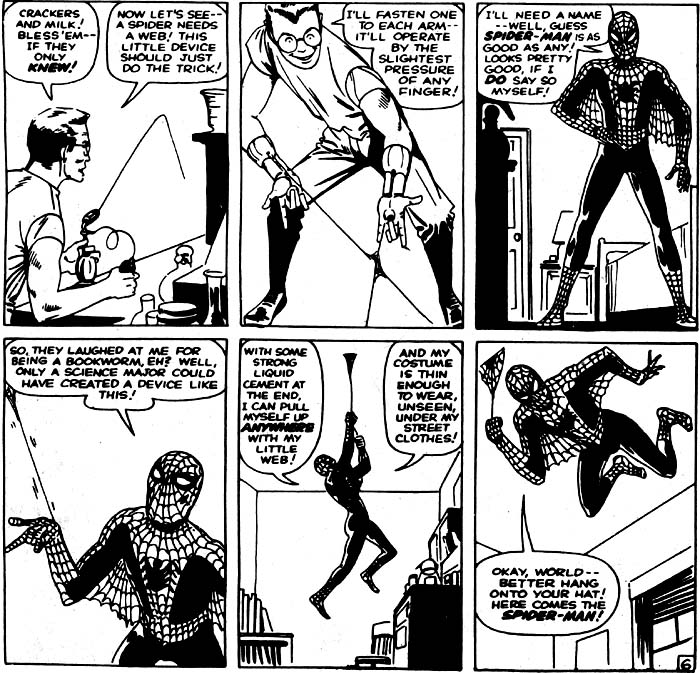
Source: Amazing Fantasy (vol. 1) #15 (Aug. 1962), pg. 6, panels 3-8. Written by Stan Lee. Art by Steve Ditko.
Peter Parker's scientific skills are used here purely for practical purposes: To enhance his "Spider-Man" identity in order to enhance his career in show business. He is doing all this for fame and fortune, not to help other people and not out of scientific curiosity. Peter here does not study the properties of his amazing web fluid just to learn more about science, and he doesn't write any scientific papers about his invention.
Contrast this behavior with that of Reed Richards, who is constantly publishing papers, obtaining patents, and spending his time and money in doing further research and exploration. At this point, Peter Parker is more interested in being on TV.
Note also the hint of bitterness in Peter toward the kids at school who "laughed at [him] for being a bookworm" (page 6, panel 6).
(There's that word again! "Bookworm." Apparently the word "nerd" wasn't around yet.)
After appearing on television as Spider-Man for the first time (page 7), Peter Parker's story takes a truly fateful turn, although he does not yet realize it...
BELOW: A surprisingly callous and self-centered Peter Parker (as Spider-Man) lets a thief escape, an irresponsible act that will impact the rest of his life:
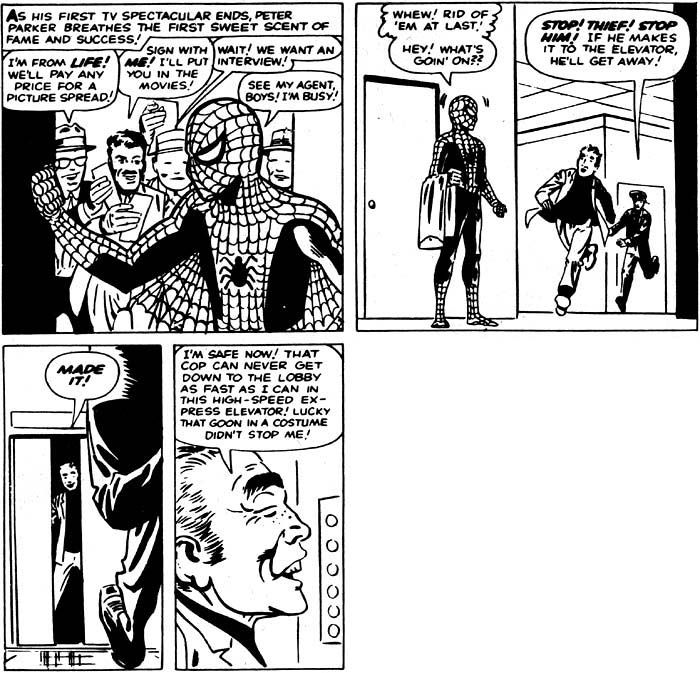
Source: Amazing Fantasy (vol. 1) #15 (Aug. 1962), pg. 8, panels 1-4. Written by Stan Lee. Art by Steve Ditko.
After his performance, it seems everybody wants to talk to Spider-Man, but he is rather dismissive of people. Already his celebrity seems to be going to his head. "See my agent, boys! I'm busy!" he tells the crowd. Out in the hall, Peter Parker thinks to himself: "Whew! Rid of 'em at last!"
BELOW: Acting selfishly, Peter Parker says he looks out only for himself:
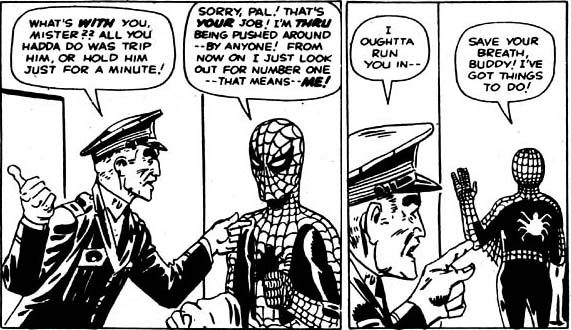
Source: Amazing Fantasy (vol. 1) #15 (Aug. 1962), pg. 8, panels 5-6. Written by Stan Lee. Art by Steve Ditko.
A thief runs right by Spider-Man, chased by a security guard. Peter just stands there and watches the thief escape on an express elevator. He really seems selfish and self-absorbed here:
Security Guard: What's with you, mister?? All you hadda do was trip him, or hold him just for a minute!
Spider-Man: Sorry, pal! That's your job! I'm thru being pushed around -- by anyone! From now on I just look out for number one -- that means -- me!
Clearly Spider-Man is not a hero yet! In fact, he seems like an insufferable jerk! This attitude is far from over...
On page 8, panels 7 and 8, we once again see a smiling, loving Uncle Ben and Aunt May. They present Peter with "that microscope [he's] always wanted," even though such a purchase isn't easy on their modest budget.
These panels further illustrate the kind, doting nature of Uncle Ben and Aunt May. Peter tells his aunt and uncle: "You're the greatest family any fella ever had."
These panels also further illustrate Peter's interest in science. He is obviously very happy to receive the microscope. "Gosh, that's terrific!" he tells his guardians, and he instantly begins looking at the gift.
But look what else we see, in panel 8 of page 8: Peter remains bitter and self-centered:
Peter Parker: [Thinking] They're the only ones who've ever been kind to me! I'll see to it that they're always happy, but the rest of the world can go hang for all I care!
BELOW: A selfish, embittered Peter Parker cares about his aunt and uncle, but the rest of the world can "go hang":
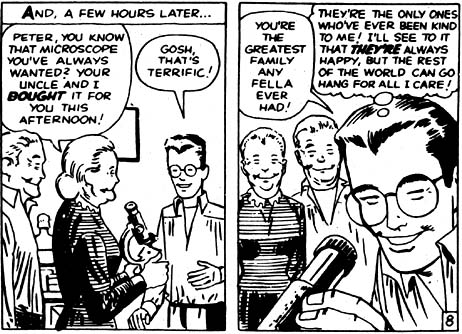
Source: Amazing Fantasy (vol. 1) #15 (Aug. 1962), pg. 8, panels 7-8. Written by Stan Lee. Art by Steve Ditko.
Thinking that the rest of the world can "go hang" is certainly not the mark of a hero, and Peter's attitude will soon change after he learns a tragic lesson. Peter's thinking here isn't even accurate. Peter's teachers are clearly very nice to him and supportive of him. Some of the kids in school, even in this first story, seem at least a little nice to him sometimes. Peter has concocted a rather negative worldview in which he is the victim of constant cruelty. Even in the few pages of this story so far it is clear that this is not an entirely accurate picture of his life.
BELOW: As Spider-Man, Peter Parker acts purely as a performer and entertainer for a considerable time before embarking on the path of a hero:

Source: Amazing Fantasy (vol. 1) #15 (Aug. 1962), pg. 9, panel 1. Written by Stan Lee. Art by Steve Ditko.
The various newspaper headlines shown in panel 1 of page 9 indicate a significant passage of time - certainly longer than the compressed period of time shown in Raimi's Spider-Man film version of this origin story.
It appears that Peter Parker spends months as a performer. There is time for a new TV series to be scheduled to feature him. He wins a "showbiz award," plays to "packed house" live venues, and prompts newspapers to wonder who he is.
There is no sure way to know just how much time Peter Parker spent as an entertainer before the next big event in his life happened. Regardless of the actual amount of time, what is important is that Peter Parker's mind seems to have been made up about what he would do with his powers: seek personal fame and fortune. It took a major life-altering event to convince him to change his attitude and his course in life.
On page 9, panels 2 through 5, Peter Parker returns home after a performance as Spider-Man to be informed by a police officer that his beloved Uncle Ben has been murdered.
Peter's grief at hearing this news is palpable. We can sense how much he loved his Uncle Ben, how much the man meant to him.
But Peter thinks of more than his grief. He wants revenge and justice, and so he sets off as Spider-Man to find the killer.
BELOW: Peter is shocked to learn that his beloved Uncle Ben has been murdered:
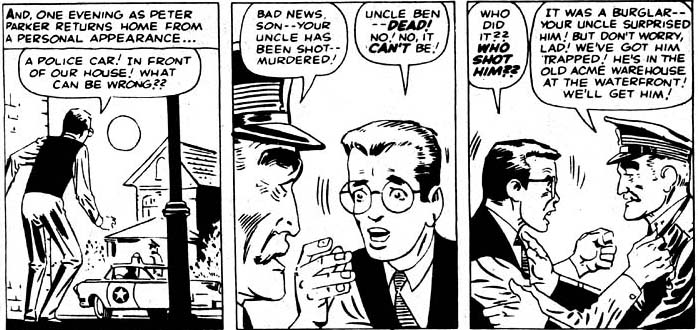
Source: Amazing Fantasy (vol. 1) #15 (Aug. 1962), pg. 9, panels 2-4. Written by Stan Lee. Art by Steve Ditko.
As far as Peter knew, it isn't necessary for Spider-Man to go after the killer. The police should be able to apprehend the killer.
police officer: It was a burglar -- Your uncle surprised him! But don't worry, lad! We've got him trapped! He's in the old Acme Warehouse at the waterfront! We'll get him!
BELOW: Peter is greatly saddened to hear of his uncle's death, but he also feels vengeful toward the kiler:
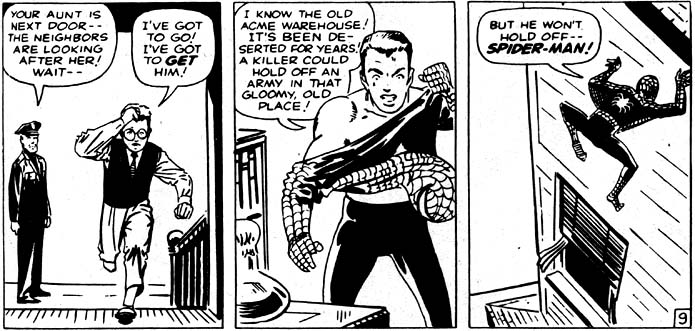
Source: Amazing Fantasy (vol. 1) #15 (Aug. 1962), pg. 9, panels 5-7. Written by Stan Lee. Art by Steve Ditko.
The police officer's assurances don't matter to Peter. He loved his uncle, and he has power, and he wants to go after the killer himself. He does so out of a desire for revenge more than sense of social responsibility to help out.
Now for the key revelation that will haunt Peter Parker for the rest of his life. When he catches the man who killed his uncle, he sees it was the same man he let escape on an elevator after his TV appearance.
Peter Parker realizes that through his own inaction, he is indirectly responsible for his uncle's death.
BELOW: A fateful turning point: Peter realizes that the man who killed his uncle is the thief he previously let escape:
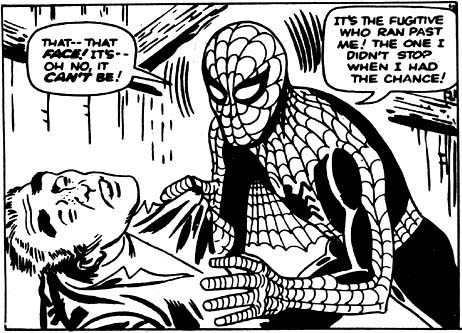
Source: Amazing Fantasy (vol. 1) #15 (Aug. 1962), pg. 11, panel 4. Written by Stan Lee. Art by Steve Ditko.
Spider-Man: That-- That face! It's-- Oh no, it can't be! It's the fugitive who ran past me! The one I didn't stop when I had the chance! ...My fault-- All my fault! If only I had stopped him when I could have! But I didn't -- and now -- Uncle Ben -- is dead . . .
Peter Parker thus has a lot to think about. These are his last words in this introductory comic story.
BELOW: Peter (as Spider-Man) captures his uncle's killer and turns him over to police unharmed:
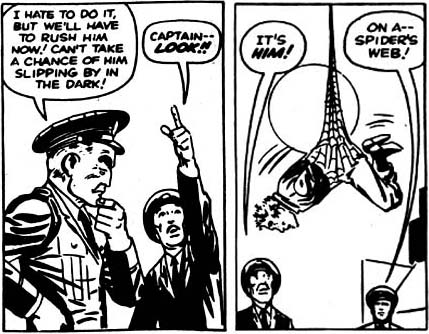
Source: Amazing Fantasy (vol. 1) #15 (Aug. 1962), pg. 11, panels 5-6. Written by Stan Lee. Art by Steve Ditko.
Interestingly enough, despite Spider-Man's understandable anger at the man who killed his anger, this revelation may cause Peter's anger to turn inward toward himself. He seems to be thinking now of his own actions (and inaction), rather than focusing on the killer. In panel 6 on page 11 we see the killer lowered on a spider web so police can take the man into custody.
Except for one well-placed punch to knock the man out, Spider-Man doesn't harm him at all. One could understand if Peter acted far more vengefully than he did. In fact, in Sam Raimi's Spider-Man feature film, it appears that the killer backs away from Spider-Man and falls to his death - something that Spider-Man probably could have prevented had he wanted to. The killer's fate in Amazing Fantasy #15 seems far more benign.
The two most likely explanations for why Spider-Man wasn't more brutal (or even fatal) in his treatment of of the killer in this comic seem to be:
1. Peter Parker was simply raised with such strong moral values that he doesn't even consider killing or unnecessarily harming anybody.
2. Having seen that the killer was the same person he previously let escape, all anger toward others dwindled compared to Peter's anger toward himself and his own self-recrimination.
Finally, we come to those famous words about power and responsibility, the most famous line from this comic, and one of the most famous phrases in comics history:
BELOW: With great power there must also come great responsibility:
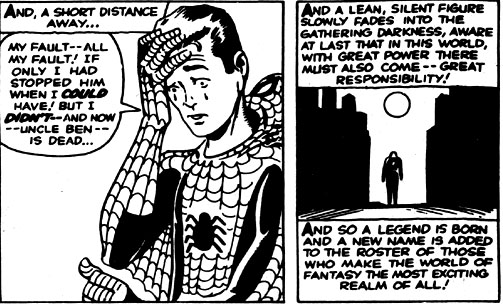
Source: Amazing Fantasy (vol. 1) #15 (Aug. 1962), pg. 11, panels 7-8. Written by Stan Lee. Art by Steve Ditko.
In the very last panel of the last page of this comic (panel 8 of page 11), the narration reads:
Narration: And a lean, silent figure slowly fades into the gathering darkness, aware at last that in this world, with great power there must also come -- great responsibility! And so a legend is born and a new name is added to the roster of those who make the world of fantasy the most exciting realm of all!
Note how this line actually appears: "With great power there must also come great responsibility." This line is typically misquoted as: "With great power comes great responsibility." Perhaps because that's how Peter Parker/Spider-Man repeats it so often himself. But both versions are very close, so the difference matters little.
More interesting is the fact that this line comes from the narration - and was not spoken by Uncle Ben in this issue. Many people incorrectly believe that it was Uncle Ben who spoke these words in this origin issue.
It makes sense, given how Peter Parker took these words to heart as almost his personal mantra or scripture, to believe that Uncle Ben did say these words to Peter at some point, off panel. In fact, in Sam Raimi's Spider-Man film, the words are given to Uncle Ben to say.
Also, note that the narration states that Peter Parker "at last" becomes aware of this lesson. It is as if this entire story was built around teaching him this lesson. Who wanted Peter to learn this? His Uncle Ben? Fate? God? Stan Lee, the writer of the story?
Whoever it was, and however it came to be, Peter Parker did learn the lesson that "with great power comes great responsibility." This lesson is undeniably one of the biggest influences on Peter Parker's life.
In many ways, Peter Parker's "religion" can be summed up in these words. More than any specific career or hobby or interest or religious affiliation or creed or ideology... The lesson Peter learned when his Uncle Ben died after his own inaction, the lesson about great power bringing great responsibility . . . this is the single-most important piece of Peter Parker's personal credo.